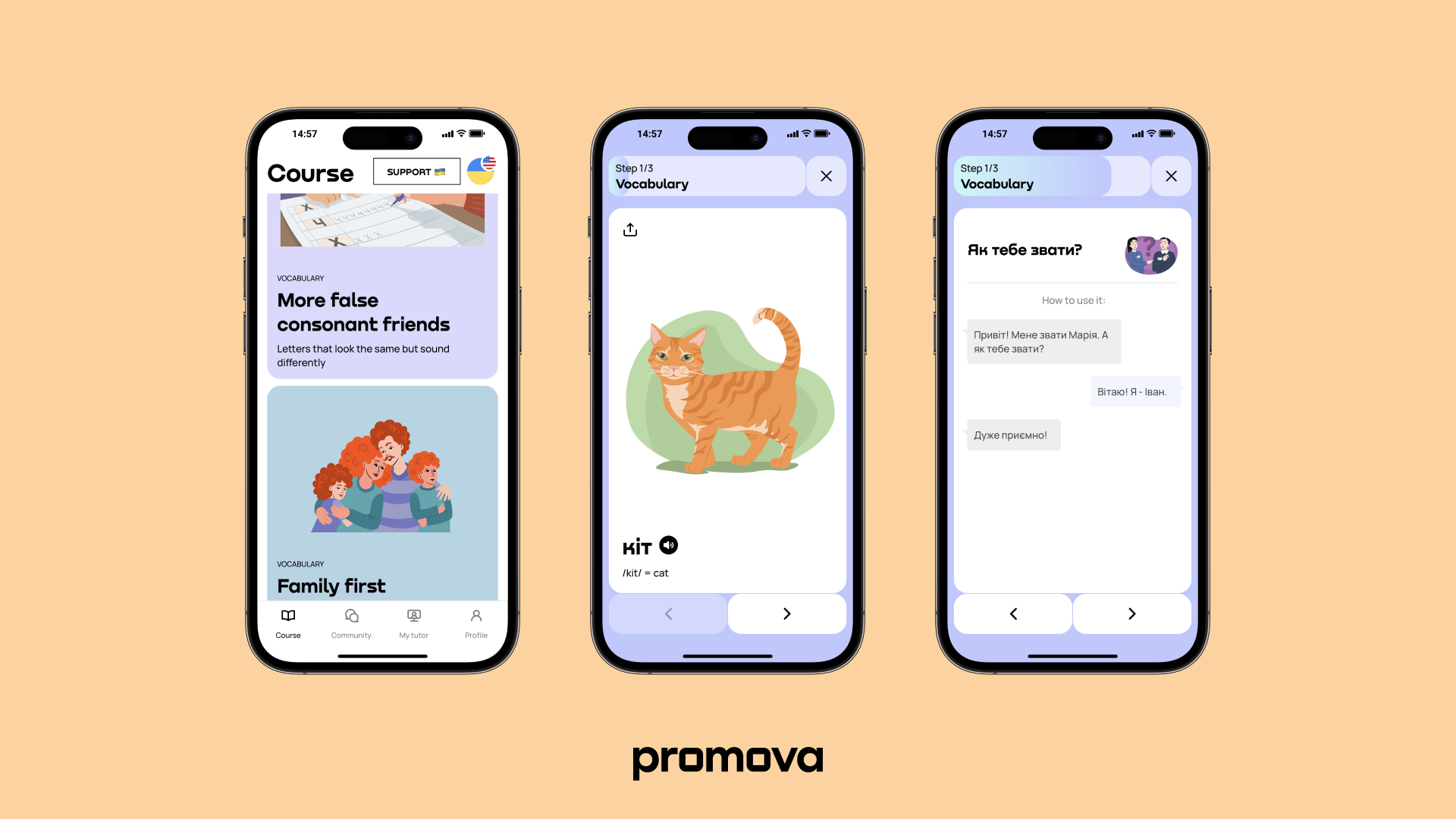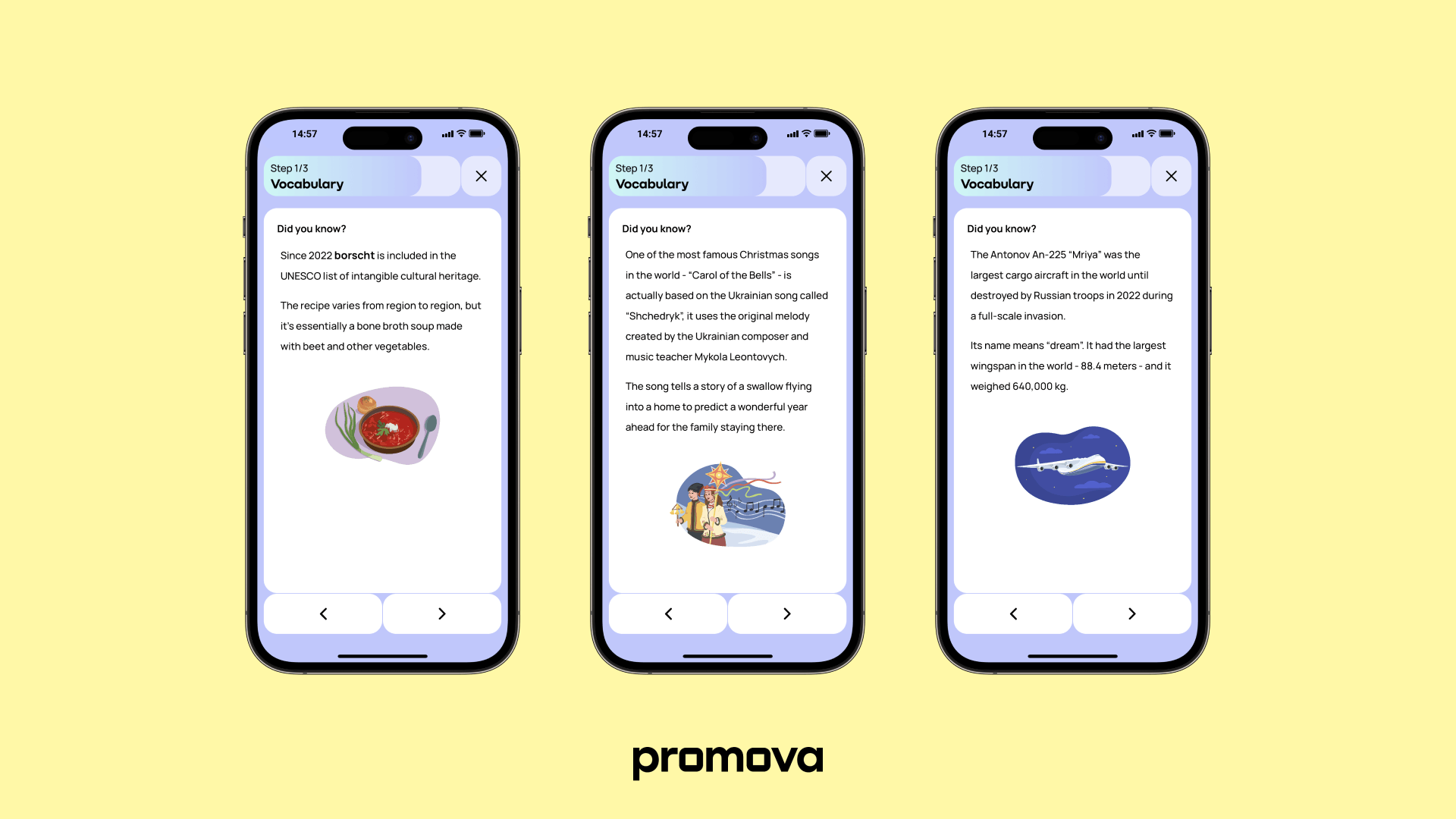Learning a new language is hard — and often boring. There’s a variety of apps on offer, but all face the challenge of retaining users as well as providing education that transfers from the screen to real-life scenarios.
Promova began four and a half years ago in Ukraine as a simple app to memorise words and expressions. It started with the ability to learn ten words a day and hit 1 million users in under a year.
It has evolved into a language platform with a strong suite of over 11 million global learners — Spanish and English are particularly popular — and offices in Kyiv, Cyprus, and LA.
The name Promova (/prɔˈmɔvʌ/), means “speech” in Ukrainian, and today to commemorate the Independence Day of Ukraine, the company has released an updated Ukrainian course, making it more well-crafted and adding more cultural context.
I spoke to Andrew Skrypnyk, the CEO and co-founder of Promova. He shared:
“We believe learning more about the Ukrainian language and culture is crucial for improving cultural understanding worldwide. This is an opportunity to tell the world more about Ukraine and commemorate our Ukrainian roots.”
The course includes 48 bite-sized lessons and a lot of cultural information. Cultural context is represented with special cards. After completing certain lessons, users receive cards with interesting cultural facts that offer more specifics.
One of the platform’s strengths is personalisation. Skrypnyk explained:
“We want to help people achieve their goals, so we establish personalised pathways within the platform. But our courses are human-guided, not just a list of planned lessons."
I’m always curious about how machine learning is being used to augment and improve teaching and learning. At Promova, it is used to identify errors in pronunciation and help speakers correct their pronunciation. But the company stresses that it won’t replace human teachers anytime soon. Skrypnyk detailed:
"Language is a personal thing. You want to talk to people, you don't want to learn to talk to machines if you want to talk to machines.
We can use AI to generate ideas, topics, and real-world topics to help tutors and local language specialists do their work. But it's still all about the people.”
And back to the challenge of retention, Promova has a few tricks up its sleeve, including 1000s of incredible images inside the app. It also hides easter eggs for people to find.
It also focuses on the immersion method of teaching — for example, classes in English are taught totally in English, which recreates how language is naturally learned from childhood. As Skrypnyk noted: “It's harder, but it's more effective.”
It's important to remember that all of Promovia’s achievements occur during Russia’s invasion of Ukraine. 80 percent of team members are still located in (safer areas) of Ukraine.
Over the last year and a half, due to the resilience and bravery that Ukraine has shown in defending its territories, dignity, and cultural heritage, there has been a worldwide rise in interest in its language and culture, which Russia has suppressed for centuries.
The search term "learn Ukrainian" has received increased interest. It peaked between February 13, 2022, and April 9, 2022 when the number of Google searches smashed the previous monthly record by more than 500%.

Since then, the trend for the Ukrainian language has continued globally, with 3,000 to 5,000 searches for "learn Ukrainian" every month. Before Russia began the full-scale war, the record figure for the preceding 5 years was 3,000 per month.
As a company with Ukrainian roots, Promova has always offered Ukrainian as a language option.
However after noticing the growing global interest in the Ukrainian language, its e-learning team decided to update our Ukrainian course, making it well-crafted and more culturally informative.
Andrew Skrypny shared:
“As a company with Ukrainian roots, we see this project as our way to honour everyone who has been supporting Ukraine in its fight for freedom, to our defenders, to our colleagues and friends, to every Ukrainian in the world who remains in the country, or who had to leave their homes.
We believe that learning more about Ukrainian language and culture is crucial for improving cultural understanding worldwide.”
“Russians tried to kill the Ukrainian culture for centuries in many ways, and we as a nation fought for the Ukrainian language. We want to save and celebrate our language and our culture.”
The Ukrainian course is suitable for learning from scratch and starts by familiarising learners with the Cyrillic alphabet and Ukrainian sounds, explained through their similarities and differences with English. Once they’re comfortable with the basics, users then learn the most common words for daily interactions.
One of the things that sets Promova’s Ukrainian course apart is the cultural context presented with special cards. After completing certain lessons, users receive cultural context cards that offer more specifics.

“Lots of people adore the moment from the Home Alone movie where Kevin sits in the church listening to the choir singing “Carol of the Bells.” But only a few of them know that it is actually based on the Ukrainian song called “Shchedryk.” “Carol of the Bells” uses the original melody created by the Ukrainian composer and music teacher Mykola Leontovych.
The English lyrics were written by Peter J. Wilhousky, an American composer, music educator, and choral conductor of Ukrainian descent.
This is only one example of the interesting facts about Ukrainian culture that we share in our course.”
Like me, you probably want to listen to it now. Here it is:



Would you like to write the first comment?
Login to post comments